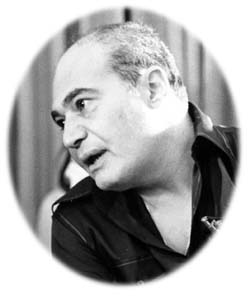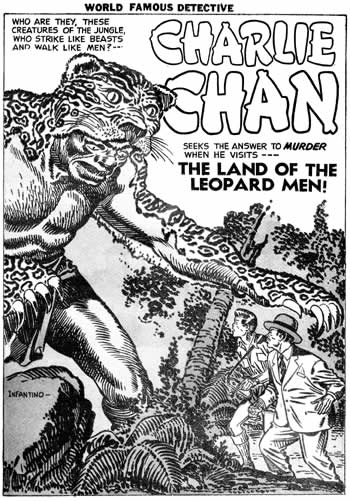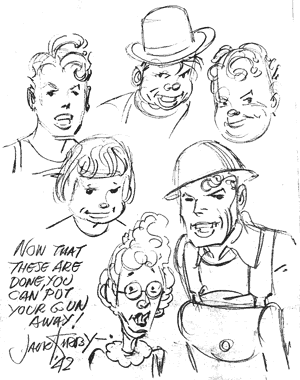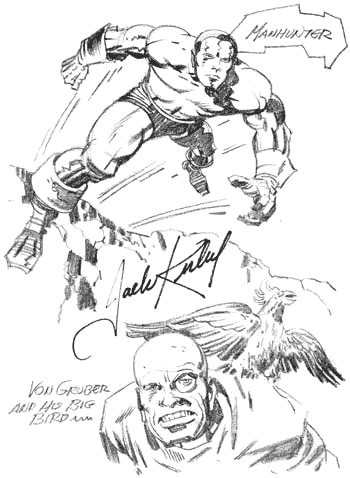The Incredible Infantino Interview
Interview conducted by Jim Amash
From Jack
Kirby Collector #34
Carmine Infantino has done it all in comics. From his early days working
for Joe Simon and Jack Kirby, through his fondly-remembered DC Comics work of
the 1960s (including inaugurating the "new look" Batman, and drawing
numerous Flash issues), to his years as publisher of DC, where he successfully
lured Kirby away from arch-rival Marvel Comics in 1970. For this interview,
we asked Carmine to elaborate on what it was like working with Simon & Kirby
in the early days. This interview was conducted at Heroes Con in Charlotte,
NC on June 16, 2000, and was copy-edited by Carmine.

1972 photo of Carmine Infantino taken at a San Diego con by Vince Davis.
Courtesy of Richard Kyle. ©2002 Vince Davis.
THE JACK KIRBY COLLECTOR: What was your first experience with Simon
& Kirby's work?
CARMINE INFANTINO: Oh, Captain America. The first Captain America. Frank
Giacoia and I saw it and we were so excited. We had to find them. We went up
to the city where they had this office where they worked, Joe and Jack, and
they were very sweet. They invited us in, they let us look at their work, talked
to us for a while, and Jack was very sweet. He showed us his artwork. We were
two kids in those days.
TJKC: About how old were you then?
CARMINE: Sixteen. It was a nice day we had-they didn't throw us out.
(Jim laughs) They were busy, too-and a kid can be a pain in the ass.
TJKC: But they had a studio, right?
CARMINE: Tudor City in New York.
TJKC: Were a lot of people working for them?
CARMINE: No, just Joe and Jack and the letterer-who was the famous letterer
they had?
TJKC: Howard Ferguson?
CARMINE: Ferguson. He was unbelievable. Great letterer. Cranky, very
cranky, old guy. You
say hello, he would say, "Go to hell." (Jim laughs) They were doing
the stuff at DC then-The Boy Commandos, "Manhunter," and what was
the other one?
TJKC: "Sandman."
CARMINE: And the "Newsboy Legion." They were churning out stuff
like crazy.
TJKC: They were fast. So do you count them among your bigger, earlier
influences?
CARMINE: Yes, extremely. Jack
especially, but Joe, too. Joe was a very sharp writer. People don't give him
much credit for that. He wrote most of his stuff; he would take-his idea would
be take classics and turn 'em into comic book stories. Remember the Boy Commandos
with the Trojan Horse? He did that all the time. He'd take a classic, twist
and turn it around, and use it and it would be great. He was very clever. I
don't think he got enough credit in his whole process. But that's not to take
anything away from Jack, obviously-the combination was magic.

This Infantino splash page from Charlie Chan #1 evokes the S&K feel.
The Kirby Checklist lists this "Land of the Leopard Men" splash
as Kirby art, but considering the Infantino signature (and the lack
of telltale Kirby in it), we believe it's all Infantino. Richard Kolkman,
time for another update!
©2002 Crestwood Publications.
TJKC: So when you went to meet them early, you saw Jack draw. What was
it like to see him draw?
CARMINE: What he would do, he never laid anything out. He'd start at
the top of the panel and just draw. (laughs) I'd go crazy. I said, "I'll
never be able to do this." It was incredible.
TJKC: How long after that did you start working in comics?
CARMINE: About a year or two. In fact, two years later, I went up to
Timely Comics. No, no, I met them before, I'm sorry. I met Joe two years before
that at Timely. He was the editor of Timely and they were doing Captain America.
That was before the studio. But I did not meet Jack then; Joe I met before.
I'm confusing this thing, I'm sorry. I did a story called "Jack Frost"
with Frank Giacoia at Timely Comics for Joe Simon, and I said to him, "Can
we meet Jack Kirby?" and he said, "He's busy," but we met him
later at Tudor City.
TJKC: How did you know they were at Tudor City? Was that common knowledge?
CARMINE: No, someone told me. I don't know who the guy was that told
me, but we tracked 'em down. When you're a fan, you track down your idols.
TJKC: When you started working in the business, did you cross paths
with them very often?
CARMINE: Let me see... yeah, years later I ran into them at Hillman Comics.
When they came out of the Army, they didn't go back to DC. They worked for Hillman,
and so did I. That's when we met. Then they went to Crestwood and they invited
me over to Crestwood to do Charlie Chan for them and I went over there.
TJKC: Did you do Charlie Chan directly for them?
CARMINE: Yep, for them directly.
TJKC: So how did that work? Did you ask for the assignment or did they
call you?
CARMINE: No, no, Joe called me and he said-and he knows I'm working with
DC-"Will you come over here and do Charlie Chan?" I said, "I
make a lot more money than you can pay for this thing," but then I thought
about it. I could be there working with Kirby and Mort Meskin. I thought it'd
be worth it. I worked for less money and I worked for him for about a year.
It was a great learning curve.
TJKC: Did you work in the studio?
CARMINE: In the studio and I would go home and do DC's work at night.
After a year, I was collapsing, I couldn't continue.
TJKC: What was it like working in the studio with them?
CARMINE: Oh, Jack taught me-tremendous. He was unbelievable.
TJKC: When he worked, did he ever make conversation?
CARMINE: He'd make conversation. You'd ask him a question and he'd answer
you. One time I did a story-it was about these two guys beating up an old lady-and
I was drawing it and I was having trouble with it. I said, "Jack, what
do I do to get this thing right?" and he says, "Don't show them
hitting her. Have one villain on the couch smiling and watching the shadow of
the other villain
hitting the old lady. That'll work in the reader's mind more than seeing the
actual action," and he was right; little things like that he taught me.
TJKC: Your figure drawing is so different than his. I assume the influence
is more in terms of storytelling then.
CARMINE: No, he was in my drawing for a while; and then he and I did
a comic strip together. I drew it and he wrote it-a western. We tried to sell
it-a newspaper strip.
TJKC: What was the name of it?
CARMINE: I can't remember now, but we couldn't sell it.
TJKC: When, late '40s?
CARMINE: A little later. It was in the '50s-sometime in the '50s.
TJKC: So you had a relationship ongoing-.
CARMINE: Yeah, a long time, and Joe and I and my family were very close.
I was close to both of them for many years.
TJKC: Your brother Jimmy worked for them, right?
CARMINE: He worked for Simon. Joe wanted him to stay in the business,
but my brother didn't want to. He wanted to go into advertising, and he did.
TJKC: With Jimmy being your brother, did that help him get in? He's
your younger brother, right?
CARMINE: I called Joe and I said, "Joe, my kid brother would like
to get a job working in the industry." And we were friends and Joe said,
"Well, send him up." And then he took to liking him-my brother was
very likable and also he was very talented. So Joe called me up, he said, "Hey,
I'm taking him on." I said, "Well, thanks." He said, "Well
don't thank me, you did me a favor sending him here." And he was very friendly
with him and Mort Meskin and Marv Stein and they used to go bowling at noon.
They would have a good time. And then when Jimmy decided to move on, Joe wanted
him to stay. He'd say, "But, Jimmy, you're making a mistake. I think you'd
be a hell of a cartoonist"-but he wanted out.
TJKC: Did you socialize with them after hours much?
CARMINE: No, we didn't socialize that much. We'd talk every once in a
while. Joe used to love to buy and sell houses and build houses. So weekends
we'd go out together looking at houses, he'd buy a house. He and my father were
very close-my father knew plumbing and he knew construction-and on weekends
we'd go look at houses and if they liked it, they'd get the plans and they'd
build it.
TJKC: Oh, my gosh. (laughter)
CARMINE: Joe is a wonderful guy.
TJKC: I remember Jack Kirby telling me that at one point-I think it
was on Long Island-he and Joe lived across the street from each other.
CARMINE: They did, in Westbury, but actually it was a different-right
across the street was over the line. One lived in Nassau, one lived in Queens,
and it was one block away. Nice houses, nice. They worked very closely in those
days.
TJKC: When they had the studio and they had other people there-.
CARMINE: You mean in Crestwood.
TJKC: Was it a big office?
CARMINE: It was fairly big.
TJKC: I want to get a sense of the times there.
CARMINE: I would say about twenty feet and Jack would be in the corner.
Mort Meskin would be next to him. Marv Stein-he's an inker-he would be there.
They'd have Ferguson and two other guys-I can't remember their names right offhand.
TJKC: And where-?
CARMINE: I had a spot in the corner.
TJKC: You were on the other side of the room.
CARMINE: The other side of the room, but once in a while I'd get up and
go watch Jack. He was terrific. He always helped.
TJKC: Whenever they had a business question, I take it that was all
Joe Simon and not Jack then.
CARMINE: Yeah, yeah. I wouldn't have business questions for him.
TJKC: I mean in terms of when's something due or when you need extra
time or what pay, that sort of thing.
CARMINE: That was done up front at the beginning.
TJKC: So who'd you deal with?
CARMINE: Joe. Always Joe. Jack never got involved in that.

We're not sure what the old lady is referring to in this 1942 Boy Commandos
sketch. There have been stories that Jack was drawing pages at night
during his WWII basic training; perhaps this was a note sent to a DC
editor who was waiting for him to finish a couple of BC pages?
Boy Commandos ™ & ©2002 DC Comics.
TJKC: Can you gauge-just at that time period, meaning post-war now-their
popularity in terms of sales and other professionals?
CARMINE: All I know is that Liebowitz was very upset that they didn't
come back to him and do more books for DC. Joe and Jack were getting a piece
of the action at Crestwood, but I think he would have given them that, actually.
So he was quite upset they didn't give him a chance to make an offer. He loved
'em. They made a lot of money for DC. Boy Commandos, the "Manhunter"....
TJKC: They were one of the few teams that had their names on the cover
of the comic.
CARMINE: Sure. They sold well.
TJKC: So I'm assuming they and Eisner and Iger were at the top then.
CARMINE: Yeah, they were kings in the
industry.
TJKC: This might be kind of corny, but did you have aspirations of ever
wanting to be like them in terms of their level of craft or-?
CARMINE: No, I wanted to go into newspaper strips. I wanted a newspaper
strip. That was always my ultimate aim. It's never happened. I could never sell
one. I tried them, but they all failed, one after the other.
TJKC: Considering how hard it is getting one off the ground-.
CARMINE: It's the worst.
TJKC: I am curious, when you started you were the inker and Giacoia
the penciler. Why did that change?
CARMINE: I don't know. I really don't know why. What happened is we started
that way for Simon and then the first time we went to DC-Frank stayed at Timely
at that time and I moved on. He remained there on staff, so he became an inker,
and I suddenly became a penciler; and that's how it turned about. So later he
became the inker and I was the penciler.
TJKC: Why didn't you ink your own stuff then?
CARMINE: Why?
TJKC: Yeah, once you became a penciler.
CARMINE: They didn't want me to. DC didn't want me to do much inking,
they wanted the penciling out of me. They'd give me occasional stories. I'd
have done fine on my inking if I'd gone on. There was a house style and I was
not the house style.
TJKC: I love "Detective Chimp."
CARMINE: Well, thank you. That was my favorite strip. But that was John
Broome's writing, a wonderful writer.
TJKC: Your inking was extremely expressive.
CARMINE: Thank you. I enjoyed doing it, but they didn't want me to do
too much. I had the Batman, I had the Flash, the Batman newspaper strip, licensing
ads, I was doing every damn thing in the book.
TJKC: So you worked for Simon & Kirby for one year?
CARMINE: A little more, I think, but we remained friends; the three of
us were very friendly.
TJKC: Did you do anything else besides Charlie Chan for them?
CARMINE: No. No, at that point I couldn't do it any more. I said, "Joe,
I can't. I just can't keep up the pace." He understood, and we remained
friends.
TJKC: It isn't like you suffered afterwards.
CARMINE: No, no. I could never appreciate how much Jack taught me.
TJKC: How did you view them personally? Their roles as a team-Jack didn't
do the business, but Joe did everything. He penciled, he inked, he would design
covers, and he was the business end as well as the creative end.
CARMINE: It probably worked well, because they didn't seem to have any
problems between them. Whatever they did worked beautifully.
TJKC: So when they interacted with each other it was about brother and
brother?
CARMINE: Oh, yes. They were very close, very close. Once in a while,
I'd meet 'em on the subway going to work. They used to live in Brooklyn at one
point-or Jack lived in Brooklyn. I don't know where Joe came in from, but they'd
meet in the subway. They'd eat and probably sleep together-they had to; they
had so much work.
TJKC: It's amazing the amount of work-.
CARMINE: Incredible. Jack would pencil, I think, five to six pages a
day, and then Joe would outline them and Jack would go back and fill the blacks
in. That's how much work he did: Penciling six and then going back and putting
the blacks in.
TJKC: Outside of the newspaper strip that you guys tried to do, you
never inked Jack? There was never a deadline crunch...?
CARMINE: No, no. I never touched his penciling work.
TJKC: Would you like to?
CARMINE: It would have been interesting. (both laugh) I'd probably be
too nervous. (more laughter)
TJKC: Dan Barry told me a story, when he tried to break in and he went
to see Simon & Kirby and Joe just said, "Jack, can I have that?"
Jack had almost finished drawing the page, and Joe hands the page to Barry and
says, "Here's a try-out."
CARMINE: Really?
TJKC: And Dan Barry was so nervous that he dropped the brush onto the
page and it rolled all down the page.
CARMINE: Oh, my God.
TJKC: Joe Simon saw that and he came over and put his hand on his shoulder
and said, "That's okay, go see Eisner and Iger."
CARMINE: Oh, boy. That's funny.
TJKC: Well, Dan wasn't happy at the time, but when he told me it was
many years later.
CARMINE: I did his strip for him for a few weeks. I did Flash Gordon
for three weeks. He called me one night and said he'd fallen behind with the
thing, and could I do a couple of weeks? So I banged out about three weeks worth.

When Jack had his personal copies of 1940s Adventure Comics collected
into hardbound volumes in the late 1960s, he included this custom pencil
drawing of Manhunter.
Manhunter ™ & ©2002 DC Comics.
TJKC: I don't want to get too gossipy here, but this is something I
am curious about. I've been in the business for a number of years now, but I
don't know what things were like back in the '50s, say when Simon & Kirby
broke up. Was that considered to be big news? Did you associate with professionals
and talk about who was doing what?
CARMINE: I never thought about it, actually. Simon was doing a Mad comic
book at that point, and Jack was doing something else. Why they broke up, I
have no idea. I don't think anyone knows to this day, and I never asked them,
because it was none of my business.
TJKC: Was there camaraderie between other professionals? Would people
go around and talk about what so-and-so was doing company-wise?
CARMINE: Not that I remember. Jack did Challengers of the Unknown, didn't
he?
TJKC: Apparently, Joe was involved with the very first story.
CARMINE: That's true. Yeah, they did that. Then Joe went on to do a book
like Mad-Sick, that's it-but I think it was a friendly break-up from what I
understood. I don't think there was any animosity between them.
TJKC: Kirby left DC because he had problems with Jack Schiff. Did you
know about that at the time? Was that a common knowledge type of thing?
CARMINE: I found out later when I wanted to hire Jack and I thought there
was a taboo there. I said, "The hell with that, I'm hiring him anyway."
The problem was a newspaper strip.
TJKC: Sky Masters.
CARMINE: Yeah, and apparently in the contract they had with each other
they were supposed to split three ways: The Wood brothers, Kirby, and Schiff
being the what-do-you-call-it-he sold the strip. I think his complaint was that
Jack aced him out of the thing. I don't know the facts.
TJKC: There was also a question about the percentage that Schiff would
get.
CARMINE: Something like that. Apparently, Jack was not happy and Schiff
wasn't happy about the whole deal and they broke up; but this is all hearsay.
I wasn't there so I can't comment.
TJKC: The reason I'm asking about this is mainly to find out whether
these were subjects people were discussing at the times.
CARMINE: No, I don't think so.
TJKC: So you just wanted to go in and do your job.
CARMINE: We were just worried about making a living. We didn't worry
about this other nonsense.
TJKC: What do you think Jack's greatest contribution to comics was?
CARMINE: He was a force. He was an amazing force in this industry. He
affected more people in this industry than anybody else, I think. There's only
two other guys, Siegel and Shuster. I think they and Joe and Jack will leave
the biggest imprint on this business. That's personal, now.
TJKC: And that's covering all the creative ends, not just the art?
CARMINE: I feel they were terrific, and Stan much later. Simon &
Kirby and Siegel and Shuster were the real giants.
TJKC: Do you feel Jack's best work was with Joe Simon overall? Would
you make a judgment like that?
CARMINE: Yes. I think 100%, yes. Go back and read some of those wonderful
stories. Together they were magnificent. This stuff sold like mad.
TJKC: Best friends.
CARMINE: Best friends. You could smell it. Genius was coming out of every
pore. They were and are my heroes!

Sign up here to receive periodic updates about what's going on in
the world of TwoMorrows Publishing.

Click here to download
our new Fall-Winter catalog (2mb PDF file)
|
